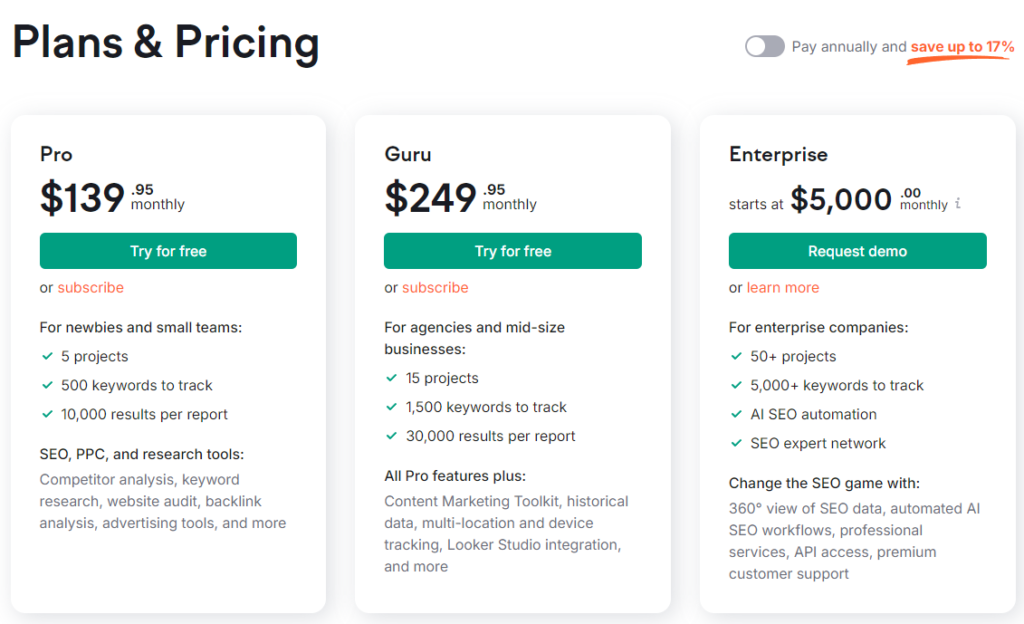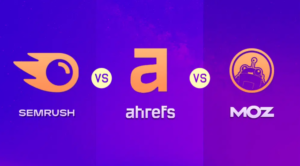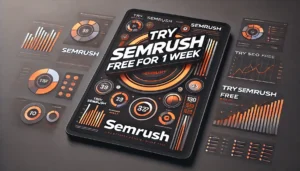When diving into the world of digital marketing, the first hurdle many newcomers face is mastering Search Engine Optimization (SEO). Understanding the technical aspects of SEO, keyword research, content strategy, and competitor analysis can be daunting. However, having the right tools can make the learning curve significantly easier. One tool that stands out for its ease of use and comprehensive features is SEMrush.
In this review, we will explore why SEMrush is particularly well-suited for beginners in digital marketing, covering its features, pricing, pros and cons, and alternatives. By the end, you’ll have a clear understanding of whether SEMrush is the right tool for you.
Table of Contents
What is SEMrush?
SEMrush is an all-in-one SEO and digital marketing platform that provides a wide range of tools designed to help businesses and individuals optimize their online presence. From keyword research to site auditing, competitor analysis, and rank tracking, SEMrush offers solutions for every stage of SEO and digital marketing.
Unlike many other SEO tools that are designed for professionals, SEMrush is remarkably beginner-friendly, offering intuitive interfaces and step-by-step guides for each feature. For someone new to digital marketing, SEMrush provides everything needed to learn and apply SEO tactics without feeling overwhelmed.
Why SEMrush is Ideal for SEO Beginners
One of the greatest advantages of SEMrush is how accessible it is for beginners in digital marketing. Many SEO tools are complex and require extensive knowledge to utilize effectively. In contrast, SEMrush provides a straightforward user experience that makes it easy to navigate and learn SEO techniques, even if you’re just starting out.
When I first began my digital marketing journey, SEMrush stood out as a game-changer. Its clean, organized dashboard made exploring the tools and features simple and unintimidating. Let’s break down why SEMrush is the perfect tool for SEO beginners.
Features: An In-Depth Look at What SEMrush Offers
SEMrush’s comprehensive suite of tools covers a wide range of digital marketing needs. For beginners, these features simplify SEO learning and help guide users through each step of the optimization process.
1. Keyword Research
Keyword research is one of the most essential aspects of SEO, and SEMrush excels in this area. For beginners, understanding which keywords to target can seem like an overwhelming task. SEMrush simplifies it by offering easy-to-understand metrics that show you the search volume, keyword difficulty, and competitive landscape for any given keyword.
- Search Volume: SEMrush displays the number of searches a keyword receives each month, helping you identify high-volume keywords that can drive significant traffic to your site.
- Keyword Difficulty: This metric shows how difficult it would be to rank for a specific keyword, allowing you to prioritize keywords that are easier to rank for.
- Keyword Suggestions: SEMrush provides a list of related keywords and phrases, giving you ideas for content creation and allowing you to expand your SEO strategy beyond just one keyword.
For a beginner, the ability to quickly see which keywords are worth targeting and which ones will likely be too competitive is invaluable. When I started, I spent hours trying to figure out how to choose the right keywords—SEMrush made this process quick and straightforward.
2. Competitor Analysis
In digital marketing, learning from competitors can be one of the most effective ways to improve your own strategies. SEMrush’s competitor analysis tool is one of its most powerful features, providing detailed insights into what your competitors are doing, how they’re ranking, and where their traffic is coming from.
For beginners, understanding what works for others in your industry gives you a roadmap to follow, cutting down the trial and error involved in SEO. SEMrush allows you to:
- Identify Competitors: Enter your domain, and SEMrush will list your top competitors in search rankings.
- Analyze Competitor Keywords: SEMrush shows you which keywords your competitors are ranking for, allowing you to identify keyword opportunities for your own site.
- Backlink Profile: See where your competitors are getting their backlinks from. Backlinks are a crucial factor in SEO, and SEMrush’s competitor analysis tool shows you which websites are linking to your competitors, providing you with link-building opportunities.
The first time I used SEMrush, I was blown away by the amount of information it provided about my competitors. As a beginner, this kind of insight was invaluable. I was able to see which keywords my competitors were using to drive traffic and started crafting a strategy to compete effectively.
3. Site Audit Tool
The site audit tool is perfect for digital marketing beginners who may not have a deep understanding of the technical aspects of SEO. It scans your website for potential issues such as broken links, missing meta tags, and slow page load speeds, providing you with a clear, easy-to-follow list of recommendations to fix these problems.
- Page Speed: Slow-loading websites can harm your rankings. SEMrush identifies areas where your website speed can be improved.
- Broken Links: Broken internal or external links can negatively impact SEO. SEMrush highlights broken links so you can quickly fix them.
- On-Page SEO: SEMrush checks for on-page SEO elements like meta tags, title tags, and header usage, giving you suggestions on how to optimize these elements for better rankings.
The best part about the site audit tool is that it doesn’t just identify issues—it also gives you solutions. For a beginner, this is incredibly helpful because you’re not left wondering how to fix technical problems. SEMrush walks you through it, step by step.
4. Rank Tracking : Easy for SEO beginners
One of the most satisfying parts of SEO is watching your website climb the search engine rankings. SEMrush’s rank tracking tool allows you to monitor your keyword rankings across multiple search engines and geographic locations. This tool provides daily updates, showing you where you’re improving and where more work is needed.
For beginners, tracking progress is important because it provides tangible results from the work you’ve done. Watching your website rise in rankings is not only motivating but also a sign that your SEO efforts are paying off.
SEMrush allows you to compare your rankings with competitors, track keywords by location, and even monitor mobile vs. desktop rankings. This level of detail is usually reserved for professional tools, but SEMrush makes it accessible to anyone.
5. Backlink Analysis
Backlinks—links from other websites to yours—are one of the most important factors in SEO. They show search engines that your content is valuable and trustworthy. SEMrush offers an in-depth backlink analysis tool that helps you build and monitor your backlink profile.
For beginners, SEMrush simplifies backlink analysis by showing you where your backlinks are coming from, how authoritative those links are, and whether your backlinks are from reputable sources. You can also use this tool to find backlink opportunities by analyzing your competitors’ backlinks.
When I started using SEMrush, I realized how essential backlinks were for improving my website’s SEO. SEMrush helped me identify valuable websites to target for link-building and gave me a better understanding of my backlink profile compared to my competitors.
Pros & Cons of SEMrush for Beginners
Pros
- User-friendly interface: Even for those who have no previous experience with SEO, SEMrush is incredibly easy to navigate. Its layout is intuitive, and every tool is labeled clearly.
- Comprehensive set of tools: SEMrush provides all the tools you need to learn and implement SEO strategies from scratch.
- Detailed tutorials and resources: SEMrush offers a wealth of educational resources, including webinars, how-to guides, and access to the SEMrush Academy, which offers free SEO courses.
- Excellent competitor analysis: Beginners can learn a lot by analyzing their competitors, and SEMrush provides detailed insights that are easy to understand.
- Free trial: SEMrush offers a 7-day free trial, allowing beginners to explore its features without any financial commitment.
Cons
- Steep learning curve for some features: While SEMrush is beginner-friendly, some of its more advanced tools, like the backlink analyzer, can take some time to fully understand.
- Expensive for small businesses: SEMrush’s pricing can be on the higher side, especially for freelancers or small businesses. However, the value it provides often justifies the cost.
Personal Experience with SEMrush
From my personal experience, SEMrush was a crucial tool when I first began my digital marketing journey. As someone with no prior experience in SEO, I found the platform’s layout and tools easy to grasp. I particularly appreciated the keyword research tool, which saved me countless hours of manual research and guesswork.
What really stood out to me was SEMrush’s competitor analysis feature. It allowed me to see which keywords my competitors were ranking for, and this insight helped me tailor my own SEO strategy more effectively. The ability to track my progress in real-time was also incredibly motivating, as it gave me immediate feedback on the success of my SEO efforts.
I also found SEMrush’s educational resources immensely helpful. The SEMrush Academy offers free courses that are perfect for beginners, and the blog is constantly updated with new insights and strategies for digital marketers. These resources gave me the confidence to not only use the tool effectively but also to deepen my understanding of SEO as a whole.
Pricing
SEMrush offers three primary pricing plans:
- Pro Plan: $119.95 per month, ideal for freelancers or small startups looking for essential SEO tools.
- Guru Plan: $229.95 per month, includes branded reports, content marketing tools, and additional features for growing businesses.
- Business Plan: $449.95 per month, designed for large enterprises with advanced needs like white-label reporting and extensive historical data.
While these plans may seem expensive for some beginners, SEMrush’s wide range of features and the value it offers justifies the cost for those serious about learning and applying SEO.

Alternatives to SEMrush
While SEMrush is a fantastic tool, it may not be for everyone. Here are a few alternatives worth considering:
- Ahrefs: Another all-in-one SEO tool, Ahrefs is known for its robust backlink analysis and easy-to-use interface. However, it’s more expensive than SEMrush and may not offer the same level of keyword research capabilities.
- Moz: Moz offers a simpler interface and strong keyword research tools. It’s a great option for beginners but lacks some of the advanced features SEMrush provides.
- Ubersuggest: A more affordable alternative, Ubersuggest offers many of the same tools as SEMrush at a lower price point, but it lacks the depth and accuracy of SEMrush’s data.
Conclusion
SEMrush is one of the most comprehensive and beginner-friendly SEO tools available today. Whether you’re just starting your digital marketing journey or looking to enhance your existing SEO strategies, SEMrush offers everything you need to succeed. Its intuitive interface, powerful features, and educational resources make it the perfect choice for SEO beginners who want to learn the ropes and see real results.
While SEMrush may seem pricey for small businesses or freelancers, the value it provides far outweighs the cost. Its 7-day free trial gives you the chance to explore its features without any risk, and once you start using it, you’ll quickly see how it can elevate your digital marketing efforts.
In short, SEMrush is a must-have tool for anyone serious about mastering SEO and improving their online visibility. Whether you’re an individual blogger, a small business, or a growing enterprise, SEMrush will guide you on the path to digital marketing success.





Pingback: SEO Software Affiliate - My Personal Journey and Why SEMrush Won Me Over in Just 3 Days - Wu Reviews